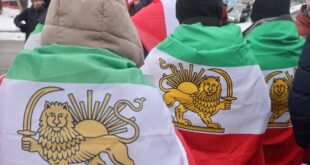A Turkish court on Monday resumed the trial of suspects in the killing of an ethnic Armenian journalist — a case widely seen as a test of whether the judiciary can fully investigate possible negligence by authorities.Â
Hrant Dink was gunned down in broad daylight in front of his Istanbul newspaper office in January. On Saturday, Turkish media aired a recording of a telephone conversation between one of the suspects and a police officer. The dialogue, though vague, suggests the police officer knew about plots to kill the journalist.Â
Dink was hated by hardline nationalists and prosecuted under Turkish law for describing the mass killings of Armenians in the early 20th century as genocide. Turkey denies the deaths constituted genocide, insisting those killed were victims of civil war and unrest.Â
Dink’s killing led to international condemnation and debate within Turkey about free speech. Turkey’s top politicians, including the prime minister, have vowed a thorough investigation.Â
The trial is taking place behind closed doors because the alleged gunman, Ogun Samast, is a minor. A total of 19 suspects are on trial.Â
At the end of the first hearing of the case held in July, judges decided to broaden the investigation to see if claims of negligence by police are true, a lawyer for Dink family, Bahri Belen said. Monday’s trial was the second hearing in the case.Â
The taped recording was aired on private NTV television and other channels on Saturday.Â
NTV said the conversation took place shortly after Dink was killed and suggests that authorities may have been able to pre-empt the killing. The transcript was placed in the court files, said a lawyer following the case who requested anonymity because of the issue’s sensitivity.Â
The Interior Ministry launched an investigation into who leaked the tape to the public, state-run media said Saturday.Â
Many Turks are convinced that a so-called “deep state” — a network of state agents or ex-officials, possibly with links to organized crime — periodically targets reformists and other perceived enemies in the name of nationalism.Â
Dink had sought to encourage reconciliation between Turkey and Armenia.Â
But he was prosecuted under Article 301 of Turkey’s penal code, which bans insults to Turkish identity, for his comments about the killings of Armenians. Dink was convicted last year. Other writers, including Nobel laureate Orhan Pamuk, have also been prosecuted under this law.Â
 Eurasia Press & News
Eurasia Press & News



